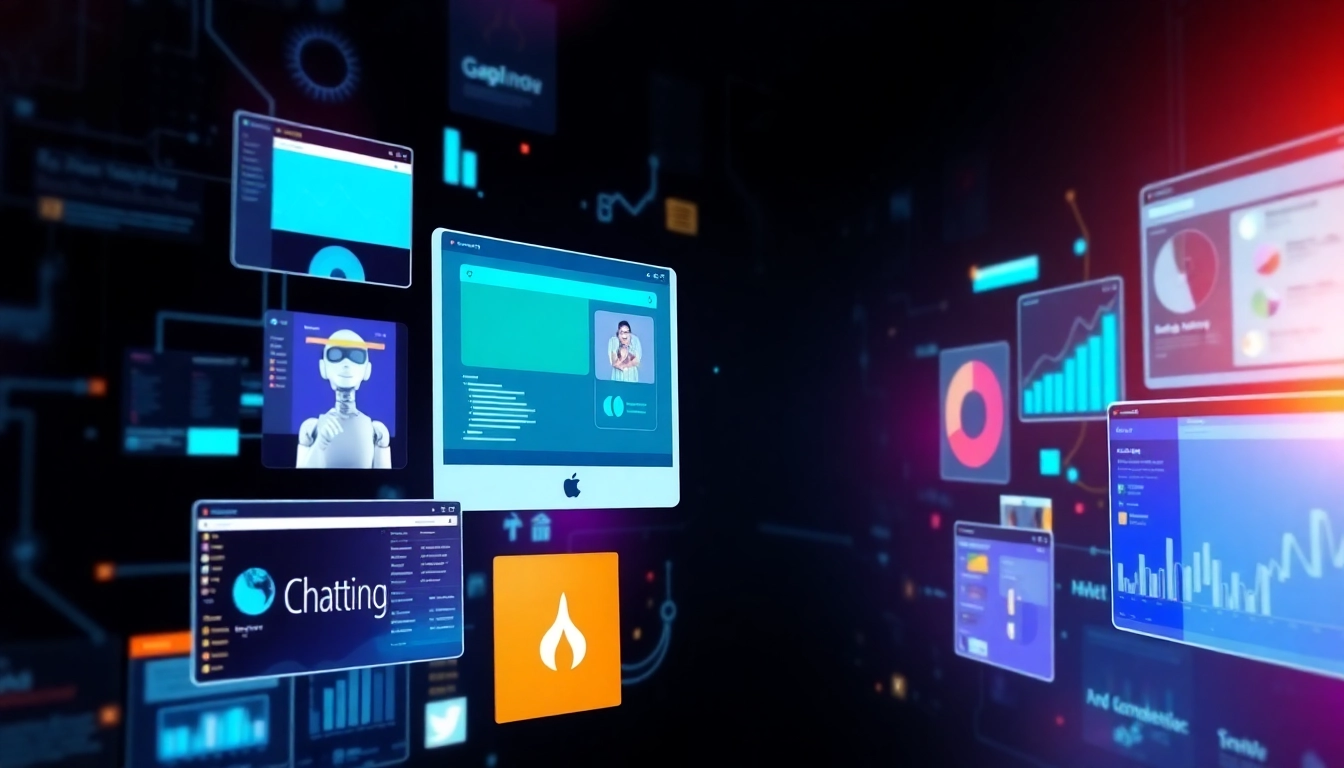
Understanding AI Marketing Tools
What Are AI Marketing Tools?
AI marketing tools are software applications powered by artificial intelligence that assist marketers in optimizing and automating various aspects of their marketing strategies. These tools leverage machine learning algorithms, data analytics, and natural language processing to help businesses gather insights, predict customer behaviors, and improve engagement across multiple channels. From chatbots to content generation systems, AI marketing tools can transform standard marketing tasks into efficient, data-driven processes, leading to improved outcomes and increased return on investment (ROI).
In an ever-evolving digital landscape, AI marketing tools have become indispensable. As companies face the pressure of maintaining relevance and competitiveness, the adoption of these tools has surged. They allow marketers to focus on strategy, creativity, and personalization while automating mundane tasks.
Benefits of Using AI in Marketing
The benefits of integrating AI into marketing strategies are profound. Firstly, AI enhances decision-making by providing precise analytics and data-driven insights. By analyzing vast amounts of consumer data, AI tools can identify trends, preferences, and behaviors that may not be immediately obvious to marketers.
Secondly, AI dramatically increases efficiency. By automating repetitive tasks such as email segmentation, content creation, and social media scheduling, marketers can save time and allocate their resources more effectively. This leads to improved productivity and a more focused approach to strategic initiatives.
Lastly, AI enables hyper-personalization. By utilizing customer data and insights, businesses can tailor their marketing efforts to individual preferences, resulting in higher engagement rates and customer satisfaction. This level of personalization can significantly boost conversion rates and encourage customer loyalty.
How AI Enhances Marketing Strategies
AI enhances marketing strategies through a variety of avenues. One of the most important is predictive analytics. By analyzing historical customer data, AI tools can forecast future behaviors and trends, allowing marketers to tailor campaigns to meet imminent market demands. For instance, predictive lead scoring can identify which leads are more likely to convert, optimizing sales efforts.
Furthermore, AI can enhance content marketing through optimization tools that analyze existing content performance and suggest improvements based on SEO best practices. This ensures content not only reaches a broader audience but also resonates with the target demographic.
Additionally, natural language processing technology enables chatbots and virtual assistants to provide immediate customer service, answer queries, and guide users through the purchase process, thus improving overall customer experience.
Key Features of AI Marketing Tools
Data Analysis and Insights
Data analysis is at the core of any effective AI marketing tool. These platforms gather and analyze data from a multitude of sources including website analytics, social media interactions, and customer feedback. The insights derived can then inform strategic decisions regarding product development, promotional strategies, and customer relationship management. For example, tools like Google Analytics can reveal how users interact with a website, allowing marketers to modify content and layout accordingly for better engagement.
Automation and Efficiency
Automation is one of the most significant benefits provided by AI marketing tools. Automation features streamline tasks such as sending emails, posting on social media, and managing marketing campaigns, allowing marketers to focus on strategy and creative work. Platforms like HubSpot and Mailchimp provide automation features that help save time and effort while maintaining a consistent brand presence across all channels.
This efficiency frees up valuable resources, enabling teams to concentrate on optimizing campaigns and enhancing user engagement rather than getting bogged down in repetitive tasks.
Personalization Capabilities
The ability to personalize content is a major advantage of using AI marketing tools. With access to customer data, AI can segment audiences and provide tailored experiences. For instance, platforms such as Segment and Evergage help in delivering personalized content based on user behavior and preferences. Tailoring experiences fosters stronger customer relationships and promotes loyalty, as consumers feel that brands understand and cater to their specific needs.
Popular AI Marketing Tools in 2025
Chatbots and Customer Engagement Tools
The rise of AI-driven chatbots has reshaped customer engagement strategies. These tools offer instant communication, handle inquiries, and can guide users through sales funnels. Some notable examples include Drift, which uses AI to qualify leads in real time, and Intercom, which enhances customer interaction through automated messaging. These tools not only improve customer experience but increase efficiency by resolving issues instantly without human intervention.
Content Creation and SEO Optimization Tools
Content creation has also evolved with AI tools that can generate written content, suggest topics, and optimize SEO. Tools like Jasper (formerly known as Jarvis) can produce blog posts, social media content, and marketing copy efficiently. Meanwhile, platforms like Surfer SEO analyze how content performs against competitors, offering actionable insights to enhance visibility and ranking on search engines. This data-driven approach ensures content is not only engaging but also optimized for discoverability.
Social Media Management Platforms
Social media management has become an essential component of digital marketing, and AI tools play a critical role in managing and optimizing social media strategies. Tools like Buffer and Hootsuite offer AI-powered features that analyze optimal posting times, suggest content based on engagement trends, and automate social listening. This empowers marketers to maintain a robust social media presence without spending excessive time on management.
Implementing AI Tools for Your Business
Steps to Integrate AI Marketing Tools
Integrating AI marketing tools into your business involves several key steps. Begin by clearly defining your marketing goals and identifying areas where AI can offer the greatest impact. Analyze your current processes and workflows to determine which tasks can be automated or optimized.
Next, choose AI tools that align with your specific needs. Consider factors such as scalability, ease of use, and the potential for integration with your existing systems. Engaging your team early in the process and providing adequate training will also facilitate smoother adoption.
Once implemented, continuously monitor performance using KPIs relevant to your marketing objectives. This will help assess whether the tools are delivering the expected benefits and provide insights for adjustments as needed.
Measuring Success and ROI
Measuring the success of AI marketing tools is essential for understanding their impact on your marketing strategy. Key performance indicators (KPIs) such as conversion rates, customer acquisition cost, and engagement levels can provide valuable insights into how well the tools are performing.
Tracking ROI involves comparing the cost of the AI tools against the revenue they generate or the cost savings they provide. For example, if an AI tool automates email marketing efforts and subsequently improves conversion rates, the increased revenue should be compared to the investment in the tool.
Regular analysis and reporting on these metrics can help optimize the use of AI tools and inform future investment decisions.
Case Studies: Successful Implementations
Several businesses have successfully integrated AI marketing tools, showcasing their transformative potential. For instance, Sephora has utilized AI-driven chatbots to enhance customer engagement on their website and social media platforms. The chatbots guide users through product discovery and purchasing processes, significantly improving customer satisfaction and sales conversions.
Another example is Coca-Cola, which employs AI to analyze social media conversations to gauge brand sentiment and track trends. This real-time data influences their marketing campaigns, allowing them to adapt quickly to consumer preferences.
Future Trends in AI Marketing Tools
Emerging Technologies to Watch
The landscape of AI marketing tools will continue to evolve, driven by emerging technologies such as augmented reality (AR) and voice search. AR can provide interactive marketing experiences, allowing customers to visualize products in their own environments before making a purchase. Voice search optimization will become increasingly crucial as more consumers rely on voice-activated devices for their inquiries.
Furthermore, the rise of advanced machine learning tools offers the potential for hyper-personalized marketing experiences. With better data processing capabilities, marketers will be able to deliver targeted content that resonates with individual preferences at scale.
Predictions for the Next Five Years
Looking ahead, the adoption of AI in marketing is expected to soar. By 2025, it is predicted that a majority of marketing tasks will be automated, freeing up human resources for more strategic initiatives. Personalization will be taken to new heights, with AI tools becoming adept at delivering tailored recommendations that anticipate customer needs before they arise.
Additionally, ethical AI practices will become paramount. As data privacy concerns grow, it will be critical for marketers to use AI tools responsibly, ensuring transparency and maintaining consumer trust.
How to Stay Ahead of the Curve
To stay competitive, businesses must continually adapt and evolve their marketing strategies. Investing in training and development will ensure teams are equipped to leverage AI tools effectively. Staying updated on industry trends and emerging technologies will provide insights into opportunities for innovation.
Furthermore, fostering a culture of experimentation can lead to new ideas and strategies that capitalize on AI capabilities. By testing different approaches and analyzing outcomes, businesses can refine their marketing efforts and remain agile in a dynamic marketplace.







